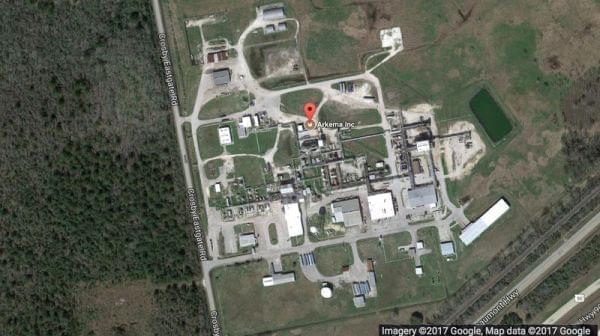Explosions Reported At Flooded Arkema Chemical Plant In Crosby, Texas

The Arkema plant in Crosby, Texas, is northeast of Houston. The company says it received reports of two explosions at the plant in the early hours of Thursday, Aug. 31. Google Maps
The Arkema plant in Crosby, Texas, was the site of a fire and chemical releases Thursday, confirming worries about volatile organic peroxides that had forced the evacuation of the surrounding community over fears that they could explode.
Due to flooding from Hurricane Harvey, the plant lost power — and the ability to safely store chemicals that can explode and cause intense fires. The company had pulled its employees from the facility earlier this week, out of concern for their safety.
Early Thursday, Arkema said that two explosions were reported at the plant northeast of Houston, adding that the Harris County Emergency Operations Center had also told it black smoke was rising from the plant.
Explosions and Smoke Reported at our Arkema Inc. Crosby Plant https://t.co/j2K6RYwMZ8
— ARKEMA (@Arkema_group) August 31, 2017
At a briefing hours later, the county's emergency and safety officials insisted that nothing at the plant had exploded.
"It wasn't an explosion, I want to be very clear. It was not an explosion," Harris County Sheriff Ed Gonzalez said of the incident, which he said was due to containers "basically popping."
Briefing on #Crosby #Arkama https://t.co/KciDWKBSgx
— Harris Co. FMO (@hcfmo) August 31, 2017
As for the gas and smoke rising from the plant, Gonzalez said, "It is not anything toxic, it's not anything we feel is a danger to the community at all."
The sheriff's department says that 15 of its deputies went to the hospital after getting close to the Arkema plant, and that while eight deputies have been released, seven others are still being evaluated. The agency has said the deputies inhaled a "non-toxic irritant."
Gonzalez compared the fumes his deputies encountered to "standing over a barbecue pit, or something like that."
Whether they're called pops, bangs or explosions, the incident centers on chemical containers in 18-wheeler boxes, said Bob Royall, assistant chief of the Harris County Fire Marshal's Office. Three of the nine boxes have lost refrigeration, but the others are still refrigerated — for now, he said.
"What will happen with these containers that are inside these box vans is, they will pop. And they will heat up, and they will catch on fire. And as such, they will burn with intensity until the fuel is consumed — and then they will die down again."
Royall and Gonzalez refused to call the incident an explosion — a distinction that drew questions from reporters at a dawn briefing in Crosby.
Royall replied that he doesn't want people thinking of "a high-order explosion — something that would be devastating."
He later added, "We haven't had massive explosions, because that's not what we expect."
In this case, Royall said, "We've heard these containers pop ... basically, they had container over-pressure."
The Occupational Safety and Health Administration lists organic peroxides under two hazard categories: one for fire, and one for "exploding bomb."
"Explosions of peroxides have caused many fatal accidents," says the National Oceanic and Atmospheric Administration. In terms of toxicity, the agency says they are "often highly toxic and irritating to the skin, eyes, and mucous membranes."
Arkema says it had planned for the worst — but that Harvey surpassed those plans, flooding the facility with six feet of water. The plant was shut down last Friday, before Harvey made landfall as a category 4 hurricane.
NPR's Debbie Elliott reports from Beaumont, Texas:
"The plant lost power, and its emergency generators. That knocked out refrigeration that keeps the chemicals stable. They're extremely flammable and burn intensely. A chain reaction of explosions is likely, and Arkema warns an environmental release into floodwaters is possible.
"It's not safe to have anyone on site, so the plan is to let the fire burn out. People within a mile and half radius in Crosby were evacuated before the fire."
The company says it began warning officials of the safety risk at the plant days ago, after its contingency plans were defeated.
Saying that the chemicals — which are used in producing plastics, resins, and other materials — "could now explode and cause a subsequent intense fire," the company added, "The high water and lack of power leave us with no way to prevent it."
Arkema says the plant "is in a rural area with no hospitals, schools, correctional facilities or recreational areas or industrial/commercial areas in the vicinity."
As NPR's Wade Goodwyn reports:
"According to the EPA, nearly 4,000 people live within a 3-mile radius. The chemical facility too is abandoned since the last 11 employees who had remained to try to keep the products from igniting were pulled out."

